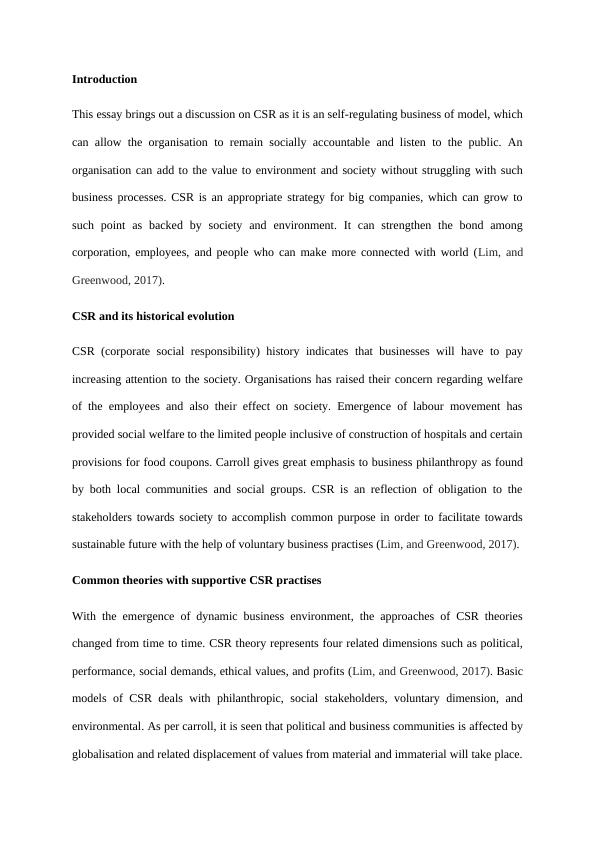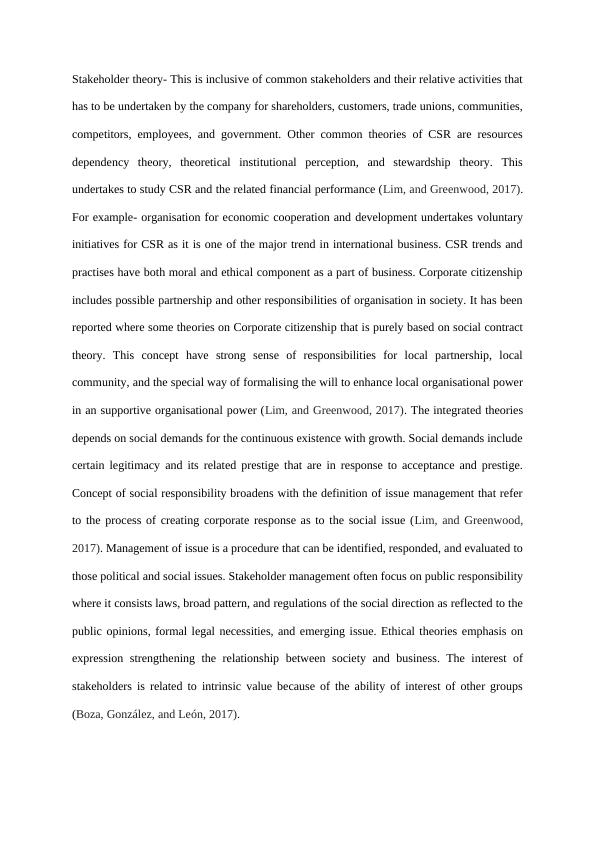Corporate Social Responsibility: Theories, Practises and Limitations
Added on 2022-10-10
6 Pages1315 Words484 Views
FINANCIAL ACCOUNTING
ASSIGNMENT
ASSIGNMENT

Introduction
This essay brings out a discussion on CSR as it is an self-regulating business of model, which
can allow the organisation to remain socially accountable and listen to the public. An
organisation can add to the value to environment and society without struggling with such
business processes. CSR is an appropriate strategy for big companies, which can grow to
such point as backed by society and environment. It can strengthen the bond among
corporation, employees, and people who can make more connected with world (Lim, and
Greenwood, 2017).
CSR and its historical evolution
CSR (corporate social responsibility) history indicates that businesses will have to pay
increasing attention to the society. Organisations has raised their concern regarding welfare
of the employees and also their effect on society. Emergence of labour movement has
provided social welfare to the limited people inclusive of construction of hospitals and certain
provisions for food coupons. Carroll gives great emphasis to business philanthropy as found
by both local communities and social groups. CSR is an reflection of obligation to the
stakeholders towards society to accomplish common purpose in order to facilitate towards
sustainable future with the help of voluntary business practises (Lim, and Greenwood, 2017).
Common theories with supportive CSR practises
With the emergence of dynamic business environment, the approaches of CSR theories
changed from time to time. CSR theory represents four related dimensions such as political,
performance, social demands, ethical values, and profits (Lim, and Greenwood, 2017). Basic
models of CSR deals with philanthropic, social stakeholders, voluntary dimension, and
environmental. As per carroll, it is seen that political and business communities is affected by
globalisation and related displacement of values from material and immaterial will take place.
This essay brings out a discussion on CSR as it is an self-regulating business of model, which
can allow the organisation to remain socially accountable and listen to the public. An
organisation can add to the value to environment and society without struggling with such
business processes. CSR is an appropriate strategy for big companies, which can grow to
such point as backed by society and environment. It can strengthen the bond among
corporation, employees, and people who can make more connected with world (Lim, and
Greenwood, 2017).
CSR and its historical evolution
CSR (corporate social responsibility) history indicates that businesses will have to pay
increasing attention to the society. Organisations has raised their concern regarding welfare
of the employees and also their effect on society. Emergence of labour movement has
provided social welfare to the limited people inclusive of construction of hospitals and certain
provisions for food coupons. Carroll gives great emphasis to business philanthropy as found
by both local communities and social groups. CSR is an reflection of obligation to the
stakeholders towards society to accomplish common purpose in order to facilitate towards
sustainable future with the help of voluntary business practises (Lim, and Greenwood, 2017).
Common theories with supportive CSR practises
With the emergence of dynamic business environment, the approaches of CSR theories
changed from time to time. CSR theory represents four related dimensions such as political,
performance, social demands, ethical values, and profits (Lim, and Greenwood, 2017). Basic
models of CSR deals with philanthropic, social stakeholders, voluntary dimension, and
environmental. As per carroll, it is seen that political and business communities is affected by
globalisation and related displacement of values from material and immaterial will take place.

Stakeholder theory- This is inclusive of common stakeholders and their relative activities that
has to be undertaken by the company for shareholders, customers, trade unions, communities,
competitors, employees, and government. Other common theories of CSR are resources
dependency theory, theoretical institutional perception, and stewardship theory. This
undertakes to study CSR and the related financial performance (Lim, and Greenwood, 2017).
For example- organisation for economic cooperation and development undertakes voluntary
initiatives for CSR as it is one of the major trend in international business. CSR trends and
practises have both moral and ethical component as a part of business. Corporate citizenship
includes possible partnership and other responsibilities of organisation in society. It has been
reported where some theories on Corporate citizenship that is purely based on social contract
theory. This concept have strong sense of responsibilities for local partnership, local
community, and the special way of formalising the will to enhance local organisational power
in an supportive organisational power (Lim, and Greenwood, 2017). The integrated theories
depends on social demands for the continuous existence with growth. Social demands include
certain legitimacy and its related prestige that are in response to acceptance and prestige.
Concept of social responsibility broadens with the definition of issue management that refer
to the process of creating corporate response as to the social issue (Lim, and Greenwood,
2017). Management of issue is a procedure that can be identified, responded, and evaluated to
those political and social issues. Stakeholder management often focus on public responsibility
where it consists laws, broad pattern, and regulations of the social direction as reflected to the
public opinions, formal legal necessities, and emerging issue. Ethical theories emphasis on
expression strengthening the relationship between society and business. The interest of
stakeholders is related to intrinsic value because of the ability of interest of other groups
(Boza, González, and León, 2017).
has to be undertaken by the company for shareholders, customers, trade unions, communities,
competitors, employees, and government. Other common theories of CSR are resources
dependency theory, theoretical institutional perception, and stewardship theory. This
undertakes to study CSR and the related financial performance (Lim, and Greenwood, 2017).
For example- organisation for economic cooperation and development undertakes voluntary
initiatives for CSR as it is one of the major trend in international business. CSR trends and
practises have both moral and ethical component as a part of business. Corporate citizenship
includes possible partnership and other responsibilities of organisation in society. It has been
reported where some theories on Corporate citizenship that is purely based on social contract
theory. This concept have strong sense of responsibilities for local partnership, local
community, and the special way of formalising the will to enhance local organisational power
in an supportive organisational power (Lim, and Greenwood, 2017). The integrated theories
depends on social demands for the continuous existence with growth. Social demands include
certain legitimacy and its related prestige that are in response to acceptance and prestige.
Concept of social responsibility broadens with the definition of issue management that refer
to the process of creating corporate response as to the social issue (Lim, and Greenwood,
2017). Management of issue is a procedure that can be identified, responded, and evaluated to
those political and social issues. Stakeholder management often focus on public responsibility
where it consists laws, broad pattern, and regulations of the social direction as reflected to the
public opinions, formal legal necessities, and emerging issue. Ethical theories emphasis on
expression strengthening the relationship between society and business. The interest of
stakeholders is related to intrinsic value because of the ability of interest of other groups
(Boza, González, and León, 2017).

End of preview
Want to access all the pages? Upload your documents or become a member.
Related Documents
Corporate Social Responsibility: Exploring Carroll's Pyramidlg...
|8
|2227
|240
Exploring the Various Aspects of Corporate Social Responsibilitylg...
|7
|2201
|435
Corporate Social Responsibilitylg...
|10
|2025
|185
Importance of Integrating Corporate Social Responsibilitylg...
|6
|452
|36
Importance of Corporate Social Responsibility and CSR Practices of Coles Supermarketslg...
|11
|3670
|41
Managing Across Borders Assignment Solvedlg...
|8
|1655
|119
